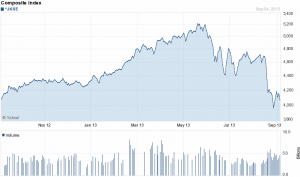There is still a lot of complacency worldwide. For example, car sales have been outstanding and our guess has been that a surge of better economic reports would be part of the final surge in the stock markets.
In early July, things started to deteriorate as regions from Turkey to Brazil to China and Indonesia were “getting hit by a brutal combination of events, as economies slow, investors pull out cash, commodity prices tumble and protesters take to the streets”. That’s how the Wall Street Journal wrote it up on July 2nd.
The news reminded of early July 1997 when the “Asian Crisis” roiled the Thai baht. It denied establishment boasts that the problem could be “isolated”. After traveling around Asia, eventually it fetched up in New York in that fateful September when the corporate bond market suffered its worst month in a decade.
This time around, the “Asian” problem started in early-July and on August 29th Bloomberg reported “Stocks in Southeast Asia are tumbling at the fastest pace in 12 years relative to global equities”.
A chart of the Indonesian Stock Market
This has been accompanied by continued weakness in Emerging Market bonds (EMB), which makes sense. US Munis (MUB) also continue to decline and the Spanish Ten-Year yield is turning up. At the close it was up to 4.62%. Rising above 4.48% is a breakout. Lower-grade corporates (HYG and JNK) became oversold a couple of weeks ago and have rallied to resistance.
In Japan, the government has indebted itself to the tune of 230% of GDP… a total exceeding ONE QUADRILLION yen.
That’s a “1 with 15 zer000000000000000‘s after it. 1,000,000,000,000,000
And according to the Japanese government’s own figures, they spent a mind-boggling 24.3% of their entire national tax revenue just to pay interest on the debt last year!
Remember this adds a minimum 25 trillion more debt each year just on interest! Not to mention the other (again at minimum) 30 trillion in deficit spending to keep the wheels on Japan. The net minimum increase in annual debt is about 55 Trillion! At least!
Slowly, somewhere between this untenable fiscal position and the radiation leak at Fukushima, a few Japanese people realized that their confidence in the system was misguided.
We are helping an increasing number Japanese residents send some funds offshore.
Why? If the government defaults on its debts or ignites a currency crisis (both likely scenarios given the raw numbers), then those folks will at least preserve a portion of their savings intact. But if nothing happens and Japan limps along, they won’t be worse off for having some cash in a strong, stable, well-capitalized offshore banking jurisdiction. Where their funds are allocated and separated from bank assets, with no liens or encumbrances.
For Japan, the smart people who see the writing on the wall just want to be prepared with a sensible solution. They’re taking action before anything financially disastrous happens.
So what can you do?
- Open accounts in various jurisdictions and currencies.
- Invest in some physical assets outside your home country.
- Make sure gold / silver funds are fully backed by allocated bullion with no liens or encumbrances.
Don’t be complacent, be prepared.


